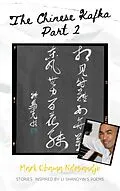Leseprobe
Calligraphy: My spring dreams are crazy
Figure 5 , . My spring dreams are crazy and make no sense, Climbing the mountain is not easy. Misty willows by the Great Blue Gate,
Clouds above the Purple Temple dance easy peasy. (3 rows, 20 characters, Cursive Cao Script M O Ndesandjo
Pleasure Trip To The West .
In the beginning18, there was no heaven and earth. Instead, a vast silence stretched into the darkness. Out of the great distances, the Creator Pangu was borne on the wings of a beam of light. Had she held a mirror up to her face she would have seen more emptiness, for she was traveling slightly beyond the speed of light itself19. At exactly 50,000 light years from where she began she decided to create the Heavens and the Earth. From her flesh, she formed the rivers, lakes and seas. From her eyes, she formed the sun and the moon. From her hair, she formed the grass and the forests. The four corners of her head formed the great Mountains Tai, Wei, Huang, and An. The light beam continued on its path and when it reached the utmost limits of the nothingness, it returned. And 50,000 light years later it passed the earth and enveloped it in its radiance. Entranced by the light, some of the Tang Emperor's subjects dreamed of joining it. One of them was the great poet, Li Shangyin. His adventure was perfectly appropriate, for poems, particularly Chinese poems, are puzzles whose pieces are gods, animals and times, eventually and miraculously linked with one's personal feelings and passions.
When Li Shangyin arrived from the 9th century in the central courtyard of a Columbus, Ohio shopping mall, everyone thought he was a quaint mannequin dressed in Arab clothes.
"Why is that man wearing a dress?" a little girl sucking her thumb asked her mother, pointing at his long black robe embroidered with emerald fish and purple cranes.
"Why has he got a bird on his hat and have such long ears?" she went on before her mother shushed her and gently pointed her towards the ice-cream shop.
Shangyin shrugged, adjusted his Tang period hat with the distinctive bird decoration, pinched his ears (to make sure his luck was still with him) and looked around.
"I'm sorry for my daughter's manners,' the mother said to Shangyin.
He just smiled beatifically. For some reason the woman liked him at once, and took him to an ice-cream shop where she introduced her husband.
"He's lost." she explained as her husband slowly nodded his head with compassion.
One thing led to another and soon the four of them were fast friends. When he tasted ice-cream for the first time he was fascinated.
"I have long heard of the marvelous hard water, but only the emperor has such a miraculous thing!"
Hearing of Shangyin's marvelous adventures, the husband was entranced, and in a burst of enthusiasm offered to put Shangyin up for the night at a fancy hotel.
Shangyin quickly made more prescient observations. This America is a huge wasteland, he thought. At least physically, and yet... He sensed a greatness of spirit in the people, as though they had been wronged once in the past but bore no bitterness - for the future was theirs. Before long he realized (with a small sense of horror) that he was happy to be out of China, as though his dreams could never be realized there. Perhaps it was love, or atonement, or even a bitter sense of revenge that drove him to feel this way.
"My treat! You've come this far, and you're definitely not a terrorist. Take a night off, my dithyramb
